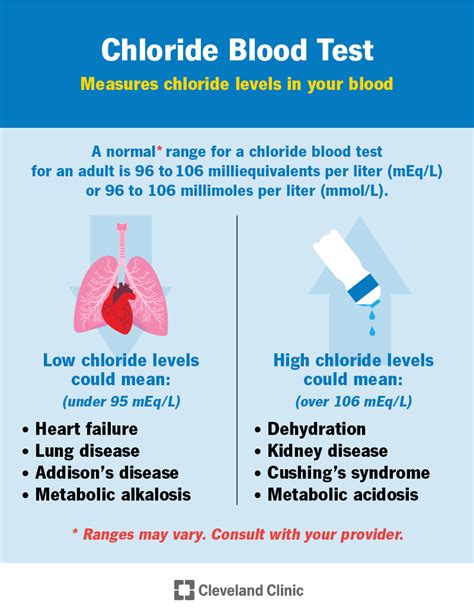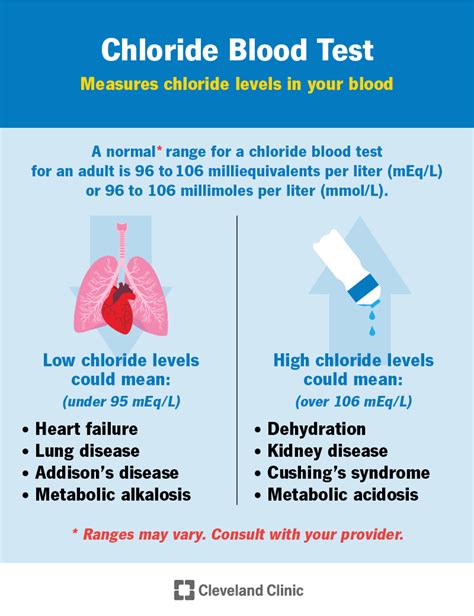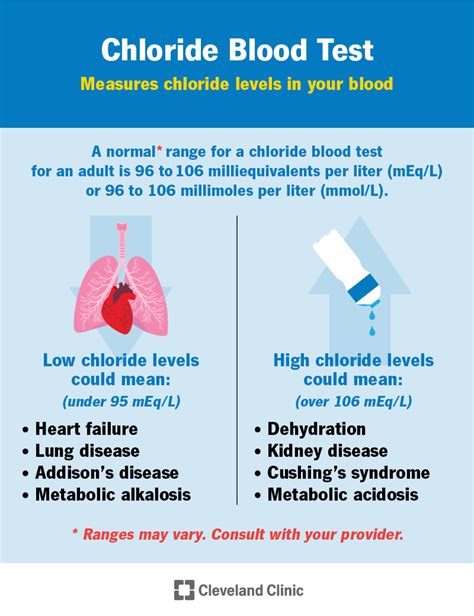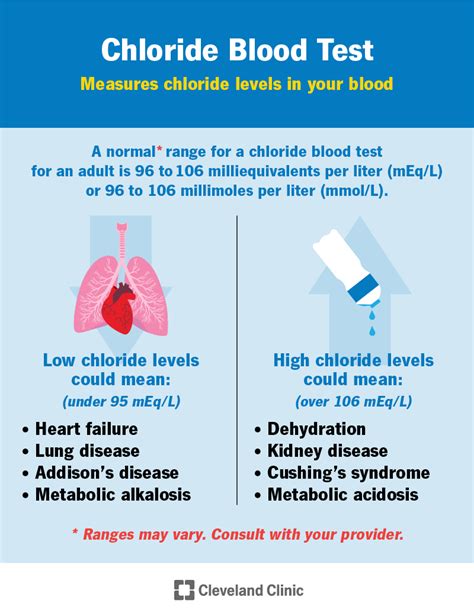Intro
Understand low chloride blood test results, causes, and symptoms. Learn about hypochloremia, electrolyte imbalance, and related kidney function, hormone regulation, and metabolic disorders.
The importance of maintaining proper chloride levels in the blood cannot be overstated. Chloride is an essential electrolyte that plays a crucial role in various bodily functions, including maintaining fluid balance, regulating blood pressure, and facilitating nerve and muscle function. When chloride levels in the blood are lower than normal, it can be a cause for concern. Low chloride blood test results can indicate a range of underlying health issues, from mild to severe. In this article, we will delve into the world of low chloride blood test results, exploring what they mean, the possible causes, and the potential consequences.
Chloride is the most abundant anion in the human body, making up approximately 70% of the total anion concentration in the blood. It is found in various bodily fluids, including blood, sweat, and tears. Chloride helps maintain proper fluid balance by regulating the amount of water in the body's cells, tissues, and organs. It also plays a crucial role in maintaining healthy blood pressure, as it helps regulate the amount of fluid in the blood vessels. Furthermore, chloride is essential for the proper functioning of nerves and muscles, as it helps transmit nerve impulses and facilitate muscle contraction.
Low chloride blood test results can be a symptom of an underlying health issue, and it is essential to understand the possible causes and consequences. A low chloride level can be caused by a range of factors, including excessive sweating, vomiting, or diarrhea, which can lead to dehydration and electrolyte imbalances. Certain medications, such as diuretics, can also cause low chloride levels by increasing urine production and leading to electrolyte loss. Additionally, underlying medical conditions, such as kidney disease, heart failure, or liver disease, can also contribute to low chloride levels.
Understanding Low Chloride Blood Test Results

Causes of Low Chloride Blood Test Results
Low chloride blood test results can be caused by a range of factors, including: * Excessive sweating, vomiting, or diarrhea, which can lead to dehydration and electrolyte imbalances * Certain medications, such as diuretics, which can increase urine production and lead to electrolyte loss * Underlying medical conditions, such as kidney disease, heart failure, or liver disease, which can contribute to low chloride levels * Dietary deficiencies, such as a low-sodium diet, which can lead to low chloride levels * Hormonal imbalances, such as adrenal insufficiency, which can affect electrolyte levelsConsequences of Low Chloride Blood Test Results

Symptoms of Low Chloride Blood Test Results
The symptoms of low chloride blood test results can vary depending on the underlying cause and severity of the condition. Some common symptoms include: * Dizziness and lightheadedness * Weakness and fatigue * Muscle cramps and weakness * Numbness or tingling in the hands and feet * Respiratory problems, such as shortness of breath * Cardiovascular problems, such as high blood pressureTreatment and Management of Low Chloride Blood Test Results

Dietary Changes for Low Chloride Blood Test Results
Dietary changes can play an essential role in managing low chloride blood test results. Some dietary changes that may be recommended include: * Increasing sodium intake, as sodium and chloride are often found together in foods * Eating foods rich in chloride, such as seaweed, celery, and tomatoes * Avoiding foods that can exacerbate low chloride levels, such as processed and high-sugar foods * Staying hydrated by drinking plenty of water and other fluidsPrevention of Low Chloride Blood Test Results

Risk Factors for Low Chloride Blood Test Results
Certain risk factors can increase the likelihood of developing low chloride blood test results. Some risk factors include: * Age, as older adults are more susceptible to low chloride levels * Sex, as women are more likely to develop low chloride levels than men * Underlying medical conditions, such as kidney disease or heart failure * Certain medications, such as diuretics * Dietary deficiencies, such as a low-sodium dietConclusion and Next Steps

What are the symptoms of low chloride blood test results?
+The symptoms of low chloride blood test results can vary depending on the underlying cause and severity of the condition. Some common symptoms include dizziness and lightheadedness, weakness and fatigue, muscle cramps and weakness, numbness or tingling in the hands and feet, respiratory problems, and cardiovascular problems.
How are low chloride blood test results treated?
+The treatment and management of low chloride blood test results depend on the underlying cause and severity of the condition. In some cases, treatment may involve addressing the underlying cause, such as treating an underlying medical condition or adjusting medications. In other cases, treatment may involve replenishing chloride levels through dietary changes or supplements.
Can low chloride blood test results be prevented?
+Yes, preventing low chloride blood test results involves maintaining a healthy lifestyle and addressing any underlying medical conditions. Some ways to prevent low chloride levels include eating a balanced diet that includes foods rich in chloride, staying hydrated by drinking plenty of water and other fluids, avoiding excessive sweating, vomiting, or diarrhea, managing underlying medical conditions, and avoiding certain medications that can cause low chloride levels.
We hope this article has provided you with a comprehensive understanding of low chloride blood test results. If you have any further questions or concerns, please do not hesitate to reach out to a healthcare professional. Additionally, we invite you to share your thoughts and experiences in the comments section below. By sharing your knowledge and insights, you can help others better understand and manage low chloride blood test results.
